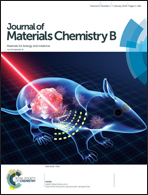Selective capture of mesenchymal stem cells over fibroblasts and immune cells on E7-modified collagen substrates under flow circumstances†
Abstract
Recruitment of endogenous mesenchymal stem cells (MSCs) has become an attractive strategy for in situ tissue regeneration. However, it is of great importance to endow an implant with a specific affinity to MSCs, for many types of cells such as immune cells and fibroblasts can also be recruited. It has been demonstrated that E7 peptides have a specific affinity to MSCs, but their selectivity for MSCs when co-cultured with other cells, especially in flow conditions, has rarely been investigated. In this study, E7-modified collagen substrates were prepared using sulfosuccinimidyl 4-(N-maleimidomethyl) cyclohexane-1-carboxylate (sulfo-SMCC) as the coupling agent. The results of X-ray photoelectron spectroscopy (XPS) and quartz crystal microbalance (QCM) proved that the densities of the immobilized E7 peptides could be modulated by changing the amounts of sulfo-SMCC. The results of cell adhesion rate, adhesion area and adhesion force demonstrated that the immobilization of E7 peptides led to a significant enhancement of the adhesion of bone marrow-derived MSCs (BMSCs) compared to RAW264.7 cells and NIH3T3 cells. The selective adhesion was verified by co-culturing BMSCs with RAW264.7 cells and NIH3T3 cells, which indicated that higher proportions of BMSCs were adhered on the E7-immobilized substrates. By mimicking in vivo flow circumstances, the selective capture of BMSCs by the E7-modified substrates was revealed by a flow model. All these results suggest that E7 immobilization might be a promising strategy for an implant to achieve a better regeneration outcome by enhancing the affinity to the recruited MSCs.



 Please wait while we load your content...
Please wait while we load your content...